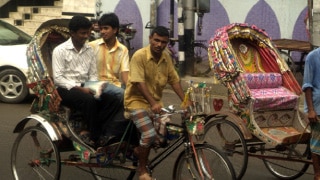PRIME PROSPECT
By Dan Keeler
Companies that ignore Bangladesh may be missing a key investment opportunity.
 |
| Photo Credits: FRITZ16 / Shutterstock.com |
Often portrayed in the media as a basket case that lurches from one natural disaster to another, Bangladesh is largely ignored by most of the corporate world. But while global headlines have fixated on catastrophic events, the country has been quietly building a robust economy. Growth has been remarkably consistent over the past decade, rarely wavering far from 6% per year. GDP per capita in dollar terms has more than doubled over the same period, and according to consultant McKinsey, exports have jumped by almost 300%.
Perhaps not surprisingly, views on the country’s potential vary widely. Some, such as Goldman Sachs economist Jim O’Neill, believe this densely populated and youthful country has the potential to become one of the world’s most vibrant economies. O’Neill includes Bangladesh in his “Next Eleven” group of countries that he expects to lead the next wave of high-growth economies. Others see it as a country whose developmental potential is stymied by political infighting and overstretched infrastructure and where business is hindered by red tape, corruption, energy shortages and the ever-present risk of social unrest.
As is the case in many frontier markets, the reality is a combination of both views. Few observers doubt that political infighting is responsible for many of the country’s problems. “Bangladesh should be a regional manufacturing powerhouse,” says Alison Graham, chief investment officer of frontier markets fund Voltan Capital Management. “Instead, the two dominant political parties focus their attention on vindictive power struggles rather than on making good policy.”
Don LaGuardia, CEO and managing partner of investment group LR Global, which runs a Bangladesh-focused fund, estimates that politics and corruption are trimming as much as four percentage points off the country’s economic growth rate. He believes, though, that the opportunities for foreign companies in Bangladesh are still significant. “Over the long term Bangladesh is positioned very well. You have a capital market that’s developing, an investor base that’s growing, and a government that is pushing privatization programs and encouraging family companies to go to the capital markets,” he notes. “The wealth effect has set in—and it’s still at a very low base.”
Abrar Anwar, head of origination and client coverage and co-head for wholesale banking for Standard Chartered Bangladesh, agrees: “Growth could be 10%,” he asserts. “The main bottleneck is infrastructure, which has not been able to keep up with demand.” Chronic energy shortages represent one of the key challenges companies investing in Bangladesh will face, according to Claudine Fry, senior analyst at risk consultancy Control Risks. But increases in natural gas production promise to boost energy supplies.
The challenges companies face are offset by significant advantages, too. “Bangladesh has very successfully positioned itself against competitors such as China and Pakistan and offers an enormous [benefit] in terms of wages,” says Fry. It provides easy access to China and India and has a government focused on boosting foreign corporate investment. That effort is paying off, particularly within the region, notes Anwar: “A lot of Asian multinationals are investing in Bangladesh—including companies from China, Malaysia, India, Singapore and Hong Kong.”
Despite roadblocks to economic progress, Bangladesh is already on the path to strong economic growth. Anwar concludes: “We have the right combination of things happening and waiting to happen—a young population, improvements in infrastructure in the offing, energy supply and broadband penetration getting top priority. It really could be like another Indonesia.”
| Location | South Asia |
| Neighbors | India, Myanmar |
| Capital city | Dhaka |
| Population | 161 million |
| GDP per capita | $791* |
| GDP growth 2012 | 6.1%* |
| Inflation 2012 | 8.5%* |
| Currency | Bangladeshi taka |
| Investment promotion agency | www.boi.gov.bd |
| Investment incentives available? | Yes |
| Ease of Doing Business rank | 129th of 185 globally, 5th of 8 in South Asia** |
| Corruption Perceptions Index rank | 144th of 176 globally*** |
| Political risk | Medium**** |
| Security risk | Medium**** |
| Government is pro-business, with robust support for foreign investors |
| Competitive labor costs; strong manufacturing base |
| Local companies open to foreign investment |
| Strategic location |
| Youthful population and substantial local market |
| Political divisions hinder development; corruption is widespread |
| Business can get tangled in red tape |
| Governance can be poor |
| Frequent energy shortages and overstretched infrastructure |
| Weak contract enforcement |
| Credit can be expensive |
Sources: * IMF World Economic Outlook Database ** World Bank ***Transparency International ****Control Risks



